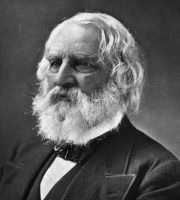by Henry Wadsworth Longfellow
MELIBOEUS.
Tityrus, thou in the shade of a spreading beech-tree reclining,
Meditatest, with slender pipe, the Muse of the woodlands.
We our country's bounds and pleasant pastures relinquish,
We our country fly; thou, Tityrus, stretched in the shadow,
Teachest the woods to resound with the name of the fair
Amaryllis.
TITYRUS.
O Meliboeus, a god for us this leisure created,
For he will be unto me a god forever; his altar
Oftentimes shall imbue a tender lamb from our sheepfolds.
He, my heifers to wander at large, and myself, as thou seest,
On my rustic reed to play what I will, hath permitted.
MELIBOEUS.
Truly I envy not, I marvel rather; on all sides
In all the fields is such trouble. Behold, my goats I am
driving,
Heartsick, further away; this one scarce, Tityrus, lead I;
For having here yeaned twins just now among the dense hazels,
Hope of the flock, ah me! on the naked flint she hath left them.
Often this evil to me, if my mind had not been insensate,
Oak-trees stricken by heaven predicted, as now I remember;
Often the sinister crow from the hollow ilex predicted,
Nevertheless, who this god may be, O Tityrus, tell me.
TITYRUS.
O Meliboeus, the city that they call Rome, I imagined,
Foolish I! to be like this of ours, where often we shepherds
Wonted are to drive down of our ewes the delicate offspring.
Thus whelps like unto dogs had I known, and kids to their
mothers,
Thus to compare great things with small had I been accustomed.
But this among other cities its head as far hath exalted
As the cypresses do among the lissome viburnums.
MELIBOEUS.
And what so great occasion of seeing Rome hath possessed thee?
TITYRUS.
Liberty, which, though late, looked upon me in my inertness,
After the time when my beard fell whiter front me in shaving,--
Yet she looked upon me, and came to me after a long while,
Since Amaryllis possesses and Galatea hath left me.
For I will even confess that while Galatea possessed me
Neither care of my flock nor hope of liberty was there.
Though from my wattled folds there went forth many a victim,
And the unctuous cheese was pressed for the city ungrateful,
Never did my right hand return home heavy with money.
MELIBOEUS.
I have wondered why sad thou invokedst the gods, Amaryllis,
And for whom thou didst suffer the apples to hang on the
branches!
Tityrus hence was absent! Thee, Tityrus, even the pine-trees,
Thee, the very fountains, the very copses were calling.
TITYRUS.
What could I do? No power had I to escape from my bondage,
Nor had I power elsewhere to recognize gods so propitious.
Here I beheld that youth, to whom each year, Meliboeus,
During twice six days ascends the smoke of our altars.
Here first gave he response to me soliciting favor:
"Feed as before your heifers, ye boys, and yoke up your
bullocks."
MELIBOEUS.
Fortunate old man! So then thy fields will be left thee,
And large enough for thee, though naked stone and the marish
All thy pasture-lands with the dreggy rush may encompass.
No unaccustomed food thy gravid ewes shall endanger,
Nor of the neighboring flock the dire contagion inject them.
Fortunate old man! Here among familiar rivers,
And these sacred founts, shalt thou take the shadowy coolness.
On this side, a hedge along the neighboring cross-road,
Where Hyblaean bees ever feed on the flower of the willow,
Often with gentle susurrus to fall asleep shall persuade thee.
Yonder, beneath the high rock, the pruner shall sing to the
breezes,
Nor meanwhile shalt thy heart's delight, the hoarse wood-pigeons,
Nor the turtle-dove cease to mourn from aerial elm-trees.
TITYRUS.
Therefore the agile stags shall sooner feed in the ether,
And the billows leave the fishes bare on the sea-shore.
Sooner, the border-lands of both overpassed, shall the exiled
Parthian drink of the Soane, or the German drink of the Tigris,
Than the face of him shall glide away from my bosom!
MELIBOEUS.
But we hence shall go, a part to the thirsty Afries,
Part to Scythia come, and the rapid Cretan Oaxes,
And to the Britons from all the universe utterly sundered.
Ah, shall I ever, a long time hence, the bounds of my country
And the roof of my lowly cottage covered with greensward
Seeing, with wonder behold,--my kingdoms, a handful of
wheat-ears!
Shall an impious soldier possess these lands newly cultured,
And these fields of corn a barbarian? Lo, whither dicord
Us wretched people hath brought! for whom our fields we have
planted!
Graft, Meliboeus, thy pear-trees now, put in order thy
vine-yards.
Go, my goats, go hence, my flocks so happy aforetime.
Never again henceforth outstretched in my verdurous cavern
Shall I behold you afar from the bushy precipice hanging.
Songs no more shall I sing; not with me, ye goats, as your
shepherd,
Shall ye browse on the bitter willow or blooming laburnum.
TITYRUS.
Nevertheless, this night together with me canst thou rest thee
Here on the verdant leaves; for us there are mellowing apples,
Chestnuts soft to the touch, and clouted cream in abundance;
And the high roofs now of the villages smoke in the distance,
And from the lofty mountains are falling larger the shadows.
Last updated January 14, 2019




